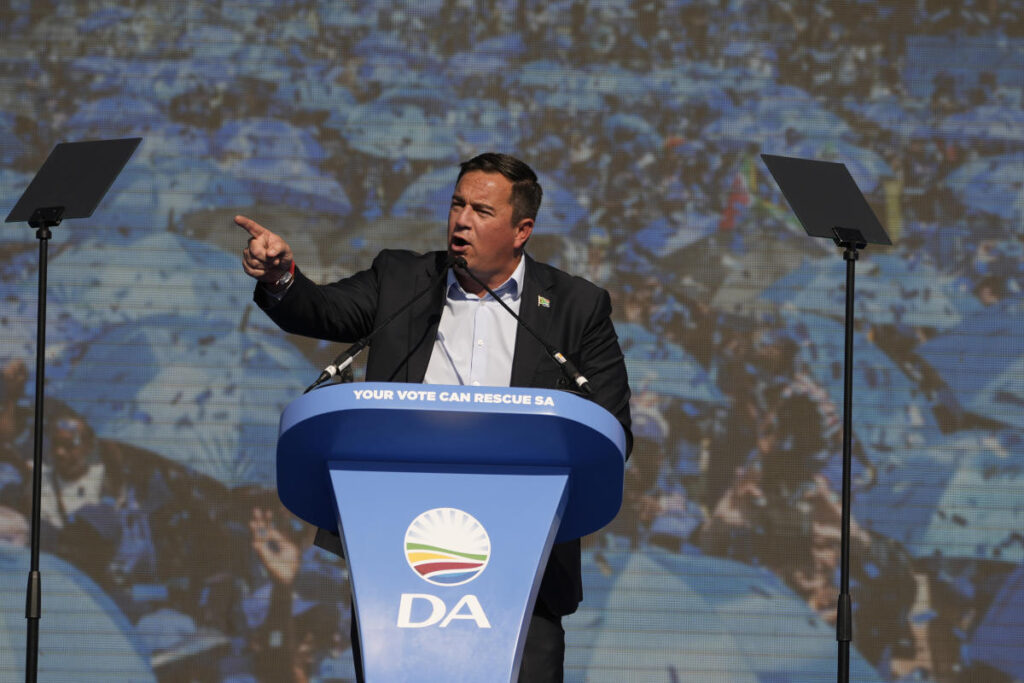CAPE TOWN, South Africa (AP) — Conflict is likely between partners in South Africa’s new coalition government but that will not be “catastrophic” for hopes of getting the country back on track, the leader of the second-largest political party said Thursday.
The Democratic Alliance of John Steenhuisen joined a coalition government led by the long-standing African National Congress, which has been in power against all odds, following national elections in May. This has made two fierce opponents from both sides of the South African political spectrum partners in government.
Analysts predicted it would be a difficult working relationship, with Steenhuisen calling it “a marriage of discomfort” for Africa’s most advanced economy, which is beset by problems of poverty, inequality, unemployment and failing state-owned enterprises.
Steenhuisen said there would likely be many moments of disagreement between his centre-right DA and the left-wing ANC over the next five years of the parliamentary term to end South Africa’s ‘deep crisis’ and that must be accepted.
“Conflict over policy … is not necessarily an existential threat to government,” Steenhuisen said in a luncheon speech to a predominantly older audience at a luxury sports club in Cape Town. “There will be conflict. There will be differences in policy.”
The ANC and the DA came together together with eight other smaller parties to form what is being called a government of national unity after weeks of difficult negotiations following the May 29 elections. The historic agreement was brokered after the long-dominant ANC lost its parliamentary majority for the first time since the end of the apartheid system of racial segregation in 1994, forcing it to find coalition partners to remain in government, and taking South Africa into uncharted political waters.
The coalition government was finally formed in late June and faces the challenge of reining in South Africa’s desperate 32% unemployment rate, the highest in the world outside a war zone. South Africa’s economy has barely grown in the past decade and Steenhuisen, the former main opposition leader who is now agriculture minister, said his party’s focus in government would be solely on those issues.
“Economic growth and job creation. Growth and jobs. I and my party will not let anything stand in our way,” he said.
The conflict Steenhuisen spoke about between the DA and the ANC could become visible on Friday if President Cyril Ramaphosathe leader of the ANC, signs an education law a law that the Public Prosecution Service strongly opposes, as Ramaphosa has said he will do.
Steenhuisen said his party would take the government it is part of to court over the law if Ramaphosa signed it, accusing the ANC of “roughly” steamrolling its coalition partners.
The DA is also strongly opposed to to a national health law introduced before the election, which will effectively make the government the sole purchaser of health care. Critics, including the DA, say it will wipe out private health care instead of improving public health care. The DA is also determined to challenge it in court, Steenhuisen said, another issue that has the two main parties holding the fate of the coalition at loggerheads.
But Steenhuisen said there is also a “long list” of policies that the ANC and DA have agreed on in the past 2 1/2 months. since the coalition government was formedespecially with regard to the reform of an economy that should play a leading role in Africa and the rest of the developing world, but which only saw GDP growth of 1.9% in 2022, compared to 0.6% last year.
Steenhuisen said Ramaphosa and the ANC had “no better ally than the Democratic Alliance” when it came to economic reforms that would create jobs and combat poverty.
___







